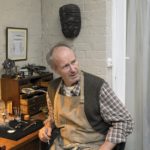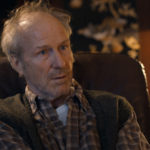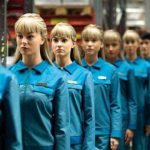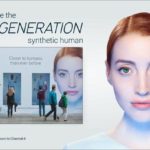Ex-Machina, reviewed recently on these pages, posed the question of whether robots were capable of artificial intelligence, defined through the capacity for cunning and duplicity. Humans, now entering series 2 on Channel 4, having been developed from an original Swedish series, takes this starting point and imposes a second question: can robots feel?
Sentient beings have as a basic tenet of their humanity the ability to feel emotions but also physical sensations, to wit pain and ability to cause suffering to human beings, to whom they should rightly be subservient, or even – feel love and loyalty. Could they overcome the limitations of their existence to take control…. or maybe they harbour other ambitions? If you believe series 1 of Humans, the answer appears to be that at least 5 have the capability for thought, feeling, conscience and ultimately free will.
The startlingly green-eyed humanoid robots in Humans, called “synths” but also referred to as “dollies”, are programmed to perform a wide range of functions, from home helps to nurses to sex workers, but the original five made by Dr. David Elster (Stephen Boxer) to support his son Leo, possess rogue code that can be activated by hackers or the innovators of these sophisticated machines – but maybe they all have unforeseen glitches?
The impact of this functionality forms the basis of this drama, notably on one, slightly bemused Hawkins family – Joe, Laura, Matty, Toby and Sophie (respectively Tom Goodman-Hill, Katherine Parkinson, Lucy Carless, Theo Stevenson and Pixie Davies), who start out familiarising themselves with Gemma Chan‘s synth Anita, only to find she is actually Mia, and has a bizarre family of her own.
Including Leo himself, being part-synth and recovered from a car crash (Colin Morgan), the original synths comprise Anita, Max (Ivanno Jeremiah), Niska (Emily Berrington), Fred (Sope Dirisu.) They have been stolen and reprogrammed for profit, gradually recover their identity and are reunited in the Hawkins household.
A fascinating scenario then from which the drama springs, though not enough of itself to fuel the series. I was fascinated by the “synth school” to which the actors playing synths had to join to overcome their human mannerisms, but over time I began to care less about the synth community and whether or not they had consciousness.
What was going on did not hold my attention, but I did become intrigued with William Hurt‘s cantankerous Dr. George Millican, retired associate of Dr Elster and therefore expert on synth coding, and his attachment to the dysfunctional synth Odi (Will Tudor) and his system glitches – perhaps some of the same psychology that attracts people to keep hold of an old car with a myriad of faults than getting a bright, new, shiny and technically advanced new model. You certainly can’t blame Millican for being turned off by his new NHS-approved synth, Vera (Rebecca Front), who would make for an excellent no-nonsense matron and maybe heralds a new direction for the service.
Despite many such interesting nuances, series 1 runs out of steam long before episode 8 – unlike Ex-Machina, which remains riveting throughout. This is more down to direction and narrative losing focus than any failing of the cast, human and synth, but in this respect it reminds me more of superhero franchises. Perhaps that’s unfair since superhero sagas tend towards the self-obsessed and
Anyway, the denouement of series 1 pits Prof Edwin Hobb (Danny Webb), who wants nothing better than the destruction of synths with human feeling and who has police power on his side, against the family/synth group. That there is a series 2 tells you all live to fight another day, though you suspect series 2 must widen its horizons, set new moral and ethical dilemmas and, well, get a bit more low-down and nasty to keep the momentum and increase the tension. We shall see, but the fans will be well happy either way.
















